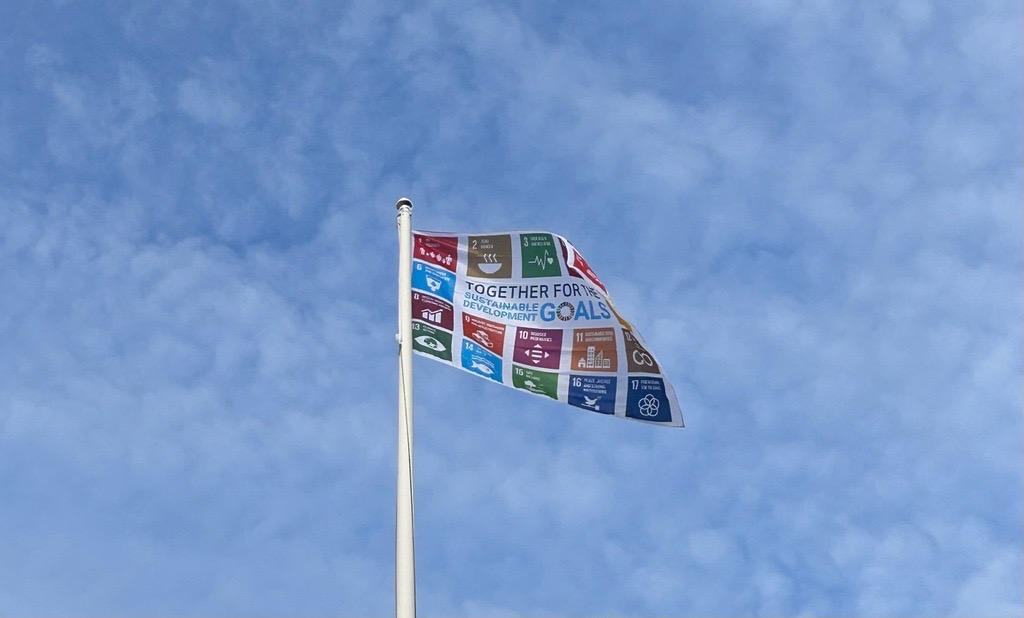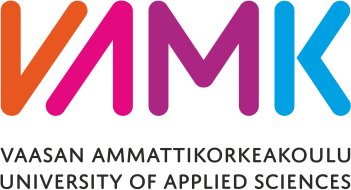
Long-term practical work towards sustainability and sustainable development goals
On the anniversary of the United Nations’ Sustainable Development Goals, flags are flown in honor of the day at Vaasa University of Applied Sciences. Concrete actions are taken daily to advance sustainable development, and efforts are continuously made to reduce one’s carbon footprint. Responsibility is evident in both the organisation’s activities and its educational offerings, which aim to train future experts in sustainable development.
Today, on September 25th, we celebrate the anniversary of the United Nations’ Sustainable Development Goals (SDGs). Vaasa University of Applied Sciences is participating in a global flag campaign with thousands of organisations to demonstrate its commitment to the UN’s sustainable development goals. These 17 goals and the Agenda 2030 action program guide the global efforts for sustainable development from 2016 to 2030.
“Sustainability and sustainable development are essential aspects of our operations at VAMK. In addition to being a strategic choice for us, sustainability is also reflected in our daily lives and everyday choices. For us, sustainability as a whole is about caring for each other, our environment, and our actions. We want to contribute to building a sustainable society, work life, environment, and future. Responsibility, especially social responsibility, has become even more meaningful in these times when the world is facing conflict, and we are recovering from the COVID-19 pandemic that has prevailed for several years,” says Katja Lakojoki-Karhu, Quality and Sustainability Manager at VAMK.
Reducing Carbon Footprint with Solar Panels
The majority of VAMK’s emissions come from procurement. Previously, substantial emissions from buildings and heating have been been significantly reduced through the use of carbon-neutral climate guarantee district heating. In August 2022, solar panels were installed on VAMK’s roof, reducing the amount of purchased electricity by about 5%. During the sunny summer, VAMK’s solar energy system generated nearly 70 MWh of electricity. Thanks to the solar panels, over 30 tons of carbon dioxide emissions have already been saved.
”In our sustainability and responsible program, we have committed to living a responsible everyday life. Energy produced by the sun is a significant step towards our carbon neutrality goal. Our sunny energy capital showcased its best during the summer, and our solar panels produced more than expected. In the future, we will take measures to reduce the amount of energy we consume,” says Sanna Torkko, VAMK’s Head of Real Estate and Security.
VAMK’s carbon footprint is calculated annually. The carbon footprint for the year 2022 is 833 tCO2-eq. This figure is higher than in previous years, primarily due to increased accuracy in procurement calculations. Such variations are quite normal in carbon footprint calculations as expertise in the field continues to develop.
”VAMK has commendably reduced emissions from its buildings. The next focus should be on emissions related to travel and procurement. Reducing air travel at an internationally oriented institution is challenging, but, for example, our domestic flights in Finland have decreased by 85% since 2019. Solutions for reducing emissions from procurement are being sought across the entire higher education sector, both by Arene and universities”, explains Asseri Laitinen, a lecturer in energy and environmental engineering at VAMK and the leader of the carbon footprint calculation working group of the Association of Finnish Universities of Applied Sciences (Arene).
Education as the Engine of Sustainable Development
Vaasan ammattikorkeakoulu kouluttaa osaajia kestävän kehityksen edistämiseksi esimerkiksi erilaisilla AMK- ja YAMK-koulutusohjelmilla. Kestävään kehitykseen liittyvien koulutusten ajankohtaisuudesta kertoo näiden koulutusohjelmien vetovoima. Syksyn 2023 yhteishaussa englanninkielinen Energy Technology-koulutusohjelma olikin suosituin tarjolla olleista koulutuksista ja siihen saatiin lähes 5 000 hakemusta. Myös erilaiset jatkuvan oppimisen opintokokonaisuudet työikäisille ovat olleet erittäin haluttuja erityisesti vetytalouden ja akkuteollisuuden saralla.
Vaasa University of Applied Sciences educates professionals to promote sustainable development through various Bachelor’s and Master’s degree programs. The relevance of education related to sustainable development is evident from the popularity of these programs. In the autumn 2023 joint application process, the English-language Energy Technology program was the most popular among the available programs, receiving nearly 5,000 applications. Various continuing education modules for working professionals have also been highly sought after, especially in the fields of hydrogen economy and battery industry.
Sustainable development is not only promoted in the field of technology, but there are also relevant training programs in the social and health care sector. The Master’s in Well-being, designed for nurses, social workers, and healthcare professionals, provides students with the skills to develop and bring about changes in societal well-being and health promotion. This program, offered for the second time, was the most attractive Master’s program in the autumn 2023 joint application process.
“We are able to offer extensive training in carbon footprint and life cycle assessment, possibly more comprehensively than most Finnish universities at the moment. These courses have attracted a significant number of degree students at both the Bachelor’s and Master’s levels, as well as professionals already in the workforce”, reflects Laitinen.
Responsibility at the Heart of the Entire Organisation’s Operations
Responsibility and sustainable development are often associated with actions related to the environment. However, many of the United Nations’ Sustainable Development Goals specifically address social and societal responsibility. Goals that are meaningful to VAMK and are promoted every day, in addition to environmental goals, include considerations for diversity, dignified work, good governance, as well as collaboration and partnerships.
While matters of responsibility are in good shape, it is important to pay attention to them. According to Lakojoki-Karhu, every member of the VAMK community can contribute to the organisation’s responsibility through their own actions.
“Each of us who is part of the VAMK community has an important role in implementing responsibility. Responsibility and responsible conduct are choices, and at their core, they often revolve around humanity and a sense of purpose,” says Lakojoki-Karhu.

